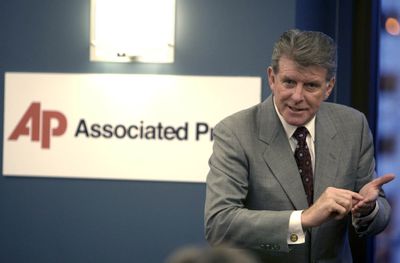Otter warns of ‘disasters’ looming with state’s bridges

The day after the Idaho House of Representatives killed Gov. Butch Otter’s proposal to raise the state’s gas tax to fund road work, the governor told a Coeur d’Alene Rotary club that putting off highway maintenance will saddle our children and grandchildren with repairs that will cost more in the future.
“We’ve got 4,000 bridges of which, in the next approximately five years, at least half of those are going to reach their designed life,” Otter told the audience of about 125 people at the Coeur d’Alene Resort. “That means, like the bridge you’ve got just north of here, we’re going to have a lot more bridges that are going to be very popular because they too are going to be appearing in Popular Mechanics … talking about them as one of the 10 worst infrastructure disasters that are waiting to happen in the state of Idaho.
“The Dover Bridge is emblematic,” Otter said of the bridge, on Highway 2, recently listed in the magazine as one of the nation’s top 10 most pressing infrastructure concerns.
“But we’ve got Dover Bridges and potential disasters all over this state,” the governor said.
The Idaho House on Thursday voted 27-43 to kill House Bill 246, which called for a 3-cent increase in the state’s 25-cent-per-gallon gas tax next year, and 2 more cents in each of the next two years. It would have raised $61.6 million a year more for road work once it was fully phased in.
Otter said he planned to return to the Legislature and ask it to “take a look at the long-term damage that’s going to be done to the highway infrastructure and the bridges. I am going to ask them once again to be responsible – let’s figure out a way.”
Former Lt. Gov. Jack Riggs, a member of the audience, drew laughs when he stood up and told Otter he spent some time pushing for highway repairs about 10 years ago “with about the same success.” With gas prices fluctuating wildly, Riggs asked, had thought been given to raising the gas tax initially, but then allowing that tax to decline as fuel prices rise?
Otter said he asked legislators precisely this question: “Is it going to be easier for you to raise 2 cents on a gallon of gas that costs a buck-85 or 10 cents on a gallon of gas that costs four bucks, where it’s gonna be two or three years from now?”
Otter said legislators have told him it’s not a good time to raise taxes at all.
“Tell me when it’s ever a good time to raise taxes. Ever! This is the first tax increase I’ve ever supported in my life, that I’ve ever asked for, that I would’ve ever voted for, let alone championed,” Otter said. “I’ve spent – since 1972 – I’ve spent all these years voting against taxes.
“Now I see how silly I was,” he added, to laughter.
Otter compared deferring maintenance on Idaho roads to the federal stimulus package, which he said also places a burden on future generations. He said some legislators have pushed hard to tap the $325 million Idaho has in reserves to address needs created by the economic downturn.
The budget crunch has caused budget writers to support a 3 percent pay cut for state employees next year, and to plan the state’s first cut to its education budget. The state’s budget already has been cut by about 6 percent this year.
Otter said, however, that he opposes spending the reserves because when he was growing up, one of nine sons and daughters of a union electrician who was regularly laid off, he learned early that resources are tapped only in a crisis.
“We’re not at a crisis level,” Otter said of the state’s economy. “We do have some money in the bank.”
He said government needs to tighten its belt, the same way every citizen and small business does when faced with tough times. Spending reserves and not making hard decisions now could lead to an increase in the state income tax or sales tax, he said.
“I believe we are of one mind in that,” he said of most legislators, adding that his position for the rest of the session will be “that we don’t expand government beyond our ability to pay today.”